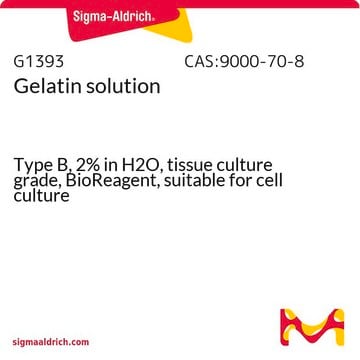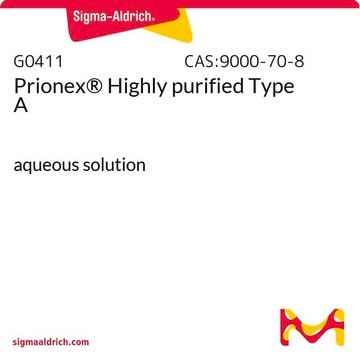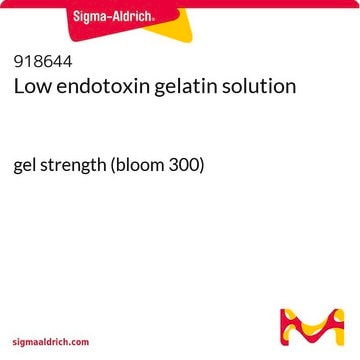924504
Gelatin Type A
300 Bloom, Low endotoxin
Synonyma:
300 Bloom, 3D Bioprinting, GelMA, Gelatin, Gelatin methacrylamide, Gelatin methacrylate, Gelatin methacryloyl
Přihlásitk zobrazení cen stanovených pro organizaci a smluvních cen
About This Item
UNSPSC Code:
12352201
NACRES:
NA.23
Doporučené produkty
Quality Level
form
powder or chunks
impurities
<10 CFU/g Bioburden
<125 EU/g Endotoxin
color
white to pale yellow
storage temp.
2-8°C
Související kategorie
Application
Low endotoxin gelatin, type A is sterile filtrated through 0.2 μm sterile filter, and lyopholized for use in biomedical applications.
Gelatin is widely used for tissue engineering and 3D bioprinting. Gelatin is derived from natural extracellular matrix (ECM) components. Due to its low cost, abundance, and retention of natural cell binding motifs, gelatin has become a highly sought material for tissue engineering applications. Gelatin solution has thermoreversible gelling property which enables synthesis of biocompatible and biodegradable hydrogels and promote cell adhesion, spreading, and proliferation.
Gelatin is widely used for tissue engineering and 3D bioprinting. Gelatin is derived from natural extracellular matrix (ECM) components. Due to its low cost, abundance, and retention of natural cell binding motifs, gelatin has become a highly sought material for tissue engineering applications. Gelatin solution has thermoreversible gelling property which enables synthesis of biocompatible and biodegradable hydrogels and promote cell adhesion, spreading, and proliferation.
Packaging
500 mg in glass bottle
Storage Class
11 - Combustible Solids
wgk_germany
WGK 3
flash_point_f
Not applicable
flash_point_c
Not applicable
Osvědčení o analýze (COA)
Vyhledejte osvědčení Osvědčení o analýze (COA) zadáním čísla šarže/dávky těchto produktů. Čísla šarže a dávky lze nalézt na štítku produktu za slovy „Lot“ nebo „Batch“.
Již tento produkt vlastníte?
Dokumenty související s produkty, které jste v minulosti zakoupili, byly za účelem usnadnění shromážděny ve vaší Knihovně dokumentů.
K W Brunson et al.
Journal of supramolecular structure, 9(2), 231-242 (1978-01-01)
Chinese hamster ovary (CHO . K1 . PRO) cell growth was inhibited by addition of a gram-negative bacterial lipopolysaccharide (LPS) to the cell culture medium. Growth inhibition began after three or four days of incubation, was dose-dependent up to a
J M Harlan et al.
Laboratory investigation; a journal of technical methods and pathology, 48(3), 269-274 (1983-03-01)
Lipopolysaccharide (LPS) produced time- and dose-dependent bovine endothelial cell injury in vitro that was manifested initially by cell detachment from culture substrate with subsequent cell lysis. Bovine endothelial cell injury was observed with LPS derived from Salmonella minnesota R595, a
E J Ziegler et al.
The New England journal of medicine, 307(20), 1225-1230 (1982-11-11)
In an effort to decrease deaths from gram-negative bacteremia and endotoxin shock, we treated bacteremic patients with human antiserum to endotoxin (lipopolysaccharide) core. Antiserum was prepared by vaccinating healthy men with heat-killed Escherichia coli J5; this mutant lacks lipopolysaccharide oligosaccharide
J G Brock-Utne et al.
Anaesthesia and intensive care, 17(1), 49-55 (1989-02-01)
Endotoxins (lipopolysaccharides, LPS) are potent bacterial poisons always present within the intestines in considerable amounts. Several pathophysiological conditions such as hypovolaemia, hypoxia, intestinal ischaemia, burns and radiation lead to a breakdown in the barrier and depending upon the extent of
T Kirikae et al.
International journal of immunopharmacology, 19(5), 255-262 (1997-05-01)
Trace amounts of endotoxin (lipopolysaccharide: LPS) are assumed to contaminate commercially available fetal bovine serum (FBS) for tissue or cell culture during the manufacturing process. We examined how cultured cells were affected by the endotoxin and how much endotoxin was
Náš tým vědeckých pracovníků má zkušenosti ve všech oblastech výzkumu, včetně přírodních věd, materiálových věd, chemické syntézy, chromatografie, analytiky a mnoha dalších..
Obraťte se na technický servis.








